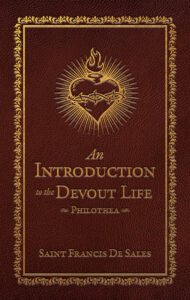All the children of Israel actually departed from Egypt, but they did not all depart heartily, wherefore in the desert some of them regretted the flesh, the melons, the leeks, and onions of Egypt. (Num. 11). And so some penitents, though they forsake sin outwardly, do not forsake the love of sin; that is to say, they resolve to sin no more, but it is with reluctance that they abstain from the fatal delights of sin, their hearts renounce it, and seek to depart, but they frequently look longingly behind them, as did Lot’s wife. They abstain from sin as a sick man abstains from dainties, which the physicians tell him will be fatal to him if he eats thereof, he abstains but most unwillingly, he talks about them, and measures how far he may transgress, at least he would fain behold what he desires, and envies those who can indulge in what is forbidden to him. Thus these weak cowardly penitents for a while refrain from sin, but reluctantly—they would fain be able to sin and yet escape condemnation—they have still all the taste for forbidden gratification, and count those happy who enjoy it.
Thus a man who is bent on revenge will change his mind whilst he is in Confession, but directly after he will find a satisfaction in discussing the subject of his dispute amongst his friends, saying, that but for the fear of God he would do so and so—that it is hard to forgive—would he might lawfully seek revenge, and so forth. Is not this man still hindered with the inclinations of sin, and although he has come out from Egypt, are not his tastes and affections lingering there with its leeks and garlic? So, also, with the woman who having abandoned her unlawful attachments still delights in admiration. Alas, such persons are in great danger!
But you, my daughter, since you desire to commence the devout life, must not only forsake sin, but wholly cleanse your heart of all attachments to sin; for besides the danger of relapse, these wretched affections enfeeble the spirit, and weigh it down so that you cannot be ready, constant, and diligent in performing good works, in which lies the very essence of devotion. A soul which having forsaken actual sin is yet always encumbered with this languishing inclination, reminds me of a person who is not ill, and yet is pale, ailing in all his functions—eating without appetite, sleeping without rest, laughing without gladness, and who instead of walking briskly, drags himself wearily along. Such a soul performs good actions, but with such spiritual languor as to deprive them of all grace, and to make them scanty and ineffective.
The first impulse to this second purification is a clear and hearty consciousness of the exceeding evil of sin, by which means we attain deep and earnest contrition. For as a feeble contrition (if it is true), and especially if united to the holy Sacraments, serves to purify us from actual sin, so deep and hearty contrition purifies us from all the affections of sin. A feeble dislike or antipathy makes us feel repugnant to its object, and glad to shun it; but a strong mortal hatred causes us not only to abhor and fly from its object, but fills us with disgust for it, so that we cannot endure to approach any person or thing in the remotest degree connected with, or reminding us of it. So when the penitent hates his sin with but a feeble (although it may be a sincere) contrition, he resolves to sin no more, but when he hates it with a hearty, vigorous contrition, he detests not only the sin itself, but every affection, circumstance, and inducement which tends towards it. Therefore, my daughter, we should seek to enlarge our contrition and repentance till they extend to everything appertaining to sin. Thus when Magdalen was converted she so lost all delight in her former sins and their pleasures, that she never again thought of them; and David declared not only that he hated sin, but that he utterly abhorred all false and evil ways (Ps. 118:104), and in this lies that spiritual renewal of which the same How to Effect This prophet speaks, saying, “thy youth shall be renewed like the eagle’s.” (Ps. 102:5).
In order to obtain this sensitiveness and contrition, exercise yourself carefully in the following meditations which, if well practiced, will, by the grace of God, uproot from your heart both sin and the affections of sin. I have prepared them to that end; and would have you take them in order, one daily, and as early in the morning as possible, for that is the fittest time for such exercises, then ponder and ruminate over it during the rest of the day. Further on, you will find due instructions if you are not already in the habit of making meditation.
This article is taken from a chapter in An Introduction to the Devout Life by St. Francis de Sales, which is available from TAN Books.









